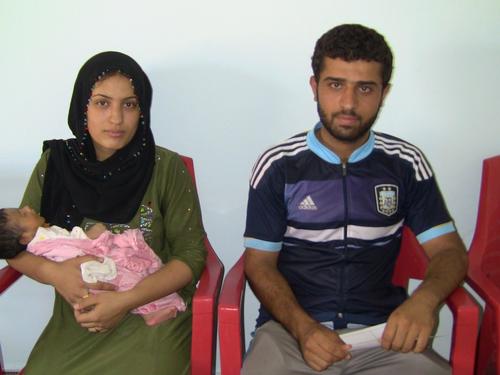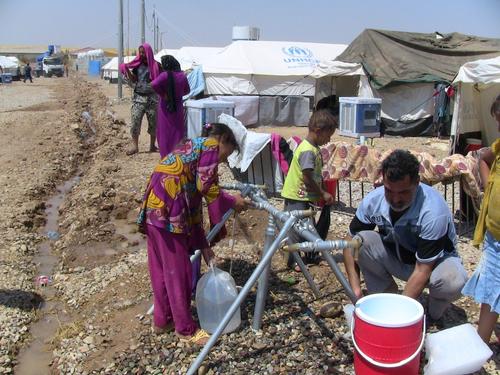Ali, a middle aged man and father of seven children is at the MSF clinic in Bharka Camp for a consultation.
“We used to live in Mosul,” he says. “But we had to escape. I am so tired of violence. Back home we were quite well off; we own two houses in Mosul. Now we live in a tent and have lost everything. Our circumstances here are very difficult, it’s very hot during the day and we have no air-conditioning. Water is also a problem. When there are power cuts the pumps don’t work anymore and we are left without water. It’s also very difficult to keep things cool without a fridge. We throw away a lot of food.
“Having a clinic in the camp where we can get the medical care we need is very important. I am here because I have a chest infection and don’t have the option of going into Erbil. The city is far and I don’t have money.”
Dr Aljuboori, is a doctor who recently moved from Baghdad to Erbil with his family due to escalating violence, and is now working at the MSF mobile clinic in Bharka Camp.
“When we first arrived here there were two ambulances but no doctors to offer primary healthcare services as a growing number of displaced people from Mosul were settling in the camp,” he says.
“This time of year it is very hot so we focus particularly on rehydration. We also give advice on how to maintain a healthy environment. The most common ailment among the camp’s population is gastroenteritis which is a consequence of deficient water supply and poor hygiene. There are not enough latrines here and there is an urgent need for drinking water. Things are improving but it’s taking time.
“We also see many people with chronic diseases who are running out of medication or who lost their prescriptions as they ran for their lives. Patients with a history of diabetes or high blood pressure or epilepsy are at great risk if they interrupt their treatment. Some patients come to us with empty boxes or with an old prescription. We look at their history and measure their blood sugar level. Once we determine what drugs they need they can collect them at our pharmacy here for free.
“Many people here are suffering from allergies, which is not surprising given the amount of dust. Residents live in tents and are continuously exposed to harsh conditions.”

Nineteen year old Sheima, a mother of two, is in the waiting room of the MSF clinic in Bharka Camp.
“I’m here to see a doctor because my baby, who is only 26 days old, was not breathing well all night and I am very worried,” she says. “I was told by some neighbours that there was a clinic providing a good service. It’s important to have a clinic and doctors to take care of us in the camp. We have many children and the conditions here are not good.
“I am from Mosul and when we fled in June I was heavily pregnant. We first moved to Qaraqosh and I gave birth there. Then we stayed for a few weeks in Bartala but the insurgents took over that city as well and we had to run again.
“We decided to come to Kurdistan hoping to find somewhere safe to settle, so my husband drove all the way to Erbil. But once we got here we had nowhere to go and were told to come to the camp. There was nothing ready when we arrived, just an abandoned warehouse with only a roof. Now some partitioning has been put in and tents have gone up, but I worry that the conditions are not good. The water is not clean and we often have power cuts.
“Most of the people here are from Mosul – both Shia and Sunni. We cannot go back, it’s not safe. My only wish is to go home.”



